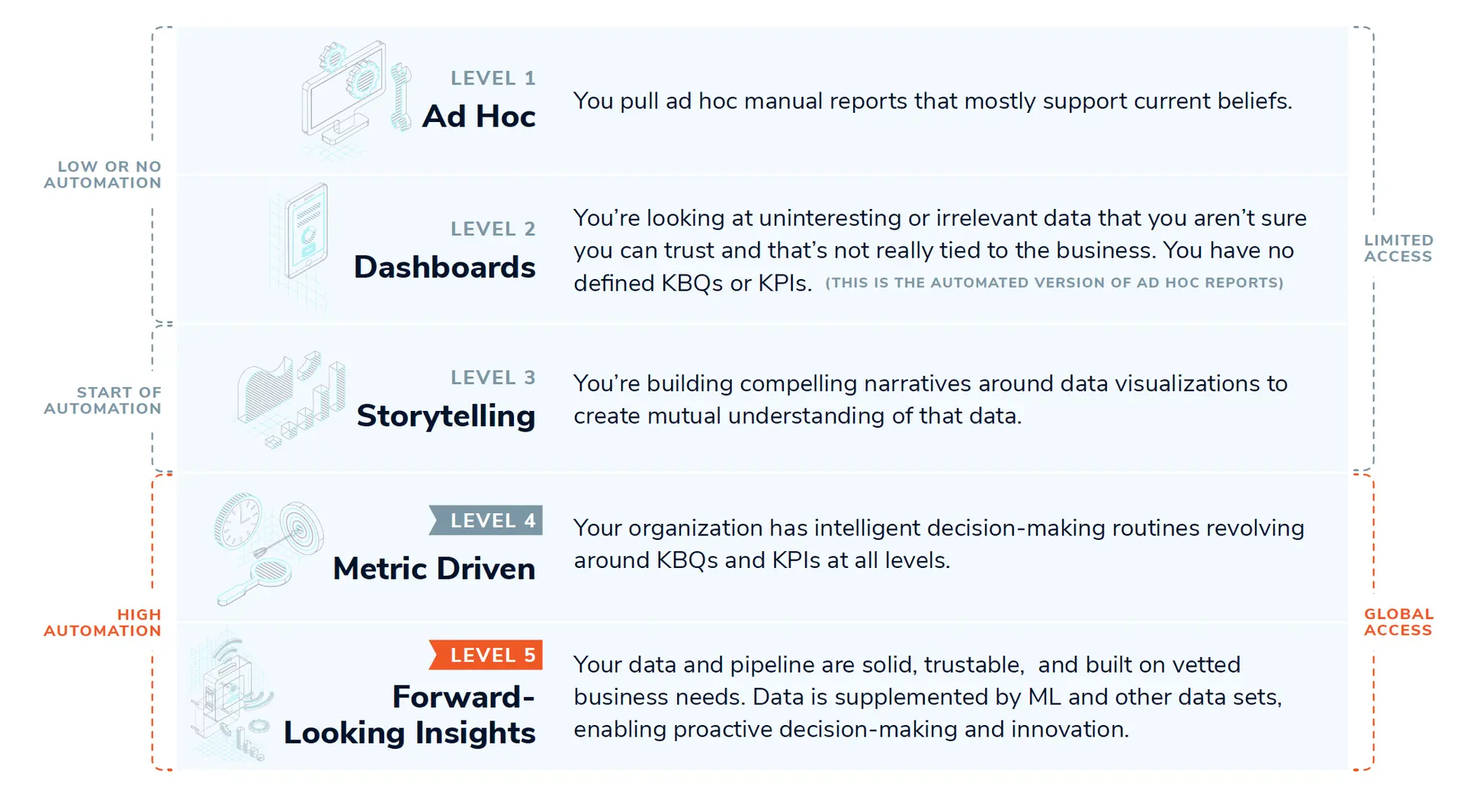Empowering Organizations Through Data Maturity and Decision-Making
Steve Yatson
Chiefe Evangelist, April 14, 2023

At productOps, we approach data proficiency with a holistic perspective, understanding that every organization operates within a unique ecosystem. To align diverse teams such as Sales and IT, we assess the organization’s position on a Data Maturity Scale, which ranges from Level 1 (Ad Hoc) to Level 5 (Predictive). This assessment lays the foundation for fostering collaboration, setting unified goals, and crafting strategies to elevate data maturity and unlock its full potential (see Figure 1).
Figure 1: Data Maturity Scale

Higher Maturity, Greater Data Value
As organizations advance on the data maturity spectrum, their ability to access and govern data expands, driving innovation and uncovering new opportunities. This cyclical growth generates trustworthy, actionable insights, enabling the realization of transformative solutions.
Data-Driven Decision-Making (DDDM): The Key to Strategic Success
Data-driven decision-making (DDDM) is the disciplined practice of leveraging data to inform, predict, and evaluate decisions against strategic objectives. By transitioning from outdated reporting methods to a culture of accessible, governed, and reliable data, organizations empower their teams to make impactful decisions in real-time. For instance, if an issue arises in production, frontline staff can use governed data to identify and address root causes immediately, fostering agility and precision across operations.
Your Data Journey: A Roadmap to Maturity
Modern organizations must think of data culture as a journey rather than a destination. While legacy systems often restricted data access to a select few through static reports and dashboards, today’s forward-thinking businesses champion transparency, inclusivity, and trust in their data ecosystems. Everyone, from executives to team members on the ground, can contribute to strategic conversations, ensuring decisions are timely and grounded in current data.
Assessing Your Data Maturity
To identify where your organization stands on its data journey, we’ve outlined the five levels of data maturity. Use this self-assessment to evaluate your current state and determine where assistance is needed to advance.
Level 1: Ad Hoc
At this stage, data is manually collected and supports existing assumptions. Access is limited, and decision-making lacks inclusivity.
Quesitons:
Do you rely on individuals to retrieve data?
Are spreadsheets your primary tool?
Do teams use inconsistent metrics?
Characteristics: Low automation, prescriptive insights, limited data visibility.
Level 2: Dashboards
Automated dashboards provide data, but trust and alignment are limited. Critical business questions (KBQs) and metrics (KPIs) may be undefined.
Quesitons:
Is your data centralized but inconsistently defined?
Do you lack standardization in metrics and terminology?
Can team members reliably access reports?
Characteristics: Low automation, prescriptive insights, limited accessibility.
Level 3: Storytelling
Data visualizations are integrated into compelling narratives, expanding data access and fostering collaborative, informed decision-making.
Quesitons:
Can you explore data beyond static dashboards?
Are multiple data sources being combined?
Is data drill-down functionality available?
Characteristics: Initial automation, inferential insights, expanded visibility.
Level 4: Metric-Driven
Governed data is available organization-wide, aligned with clearly defined KBQs, KPIs, and OKRs. Decision-making routines are informed and strategic.
Quesitons:
Are decisions tied to measurable metrics like KPIs?
Have data silos been eliminated?
Is data governance a priority?
Characteristics: High automation, inferential insights, global access.
Level 5: Predictive Analytics
The pinnacle of data maturity, this level leverages advanced analytics to forecast outcomes and inform strategic planning.
Key Features::
Fully automated and predictive systems.
Real-time insights with proactive governance.
Organization-wide trust in data.
At productOps, we specialize in guiding organizations through this journey—helping them build a data-driven culture that aligns with their business objectives, fosters collaboration, and drives innovation.